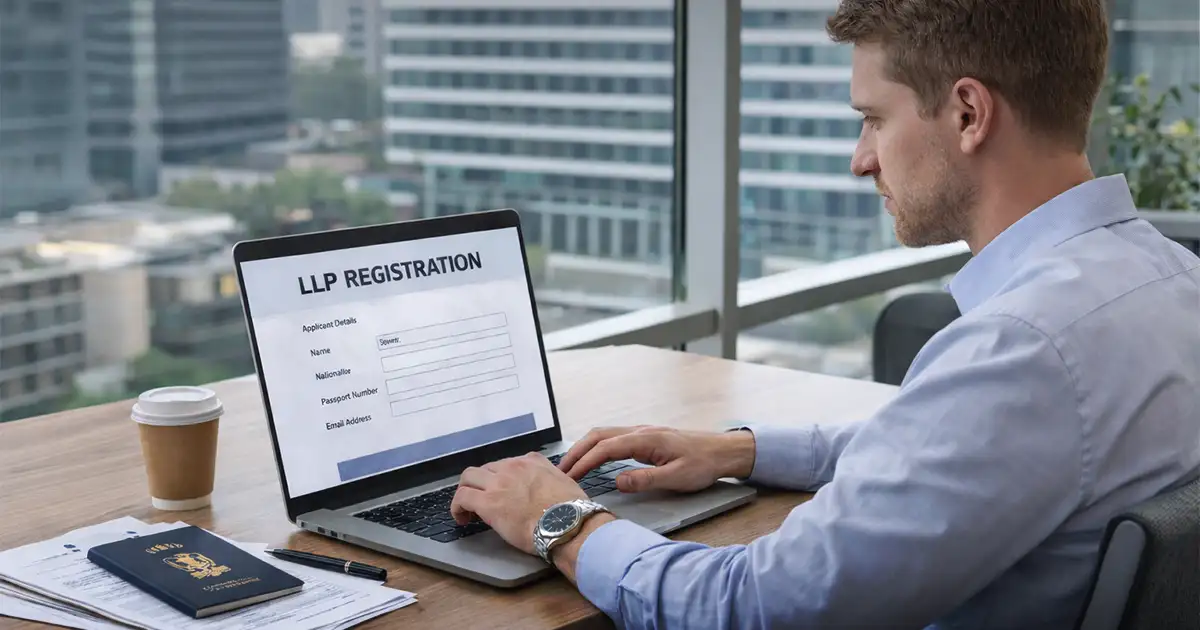
What are the Documents Required for LLP Registration in India?
Dreaming of starting your own business? A Limited Liability Partnership (LLP) can make that dream a reality quickly and safely. LLP registration blends the freedom of a partnership with the protection of limited liability. Having your LLP registration documents ready lets you kickstart your business without delays and protects your personal assets along the way.
Whether you’re a startup founder, a freelancer, or a small business owner, getting your documents in order is like having a head start. It saves time, avoids roadblocks, and makes the process smooth from start to finish.
In this blog, we provide a detailed list of documents required for LLP registration in India. The documents are categorized for options like:
- LLP Partners
- Registered Office Address
- LLP Agreement and Incorporation Paperwork
We have discussed the required documents for each category in detail and explained why each document matters. The blog also shares practical tips to make your LLP registration in India simple and stress-free. All details follow the latest updates from the Limited Liability Partnership Act, 2008, and the Ministry of Corporate Affairs (MCA).
List of Documents Required for LLP Registration
The documents needed for LLP incorporation can be sub-divided into three basic categories:
1. Documents Required for LLP Partners
To register an LLP, each partner must submit valid identity and address proofs. The MCA verifies these documents to confirm the partner’s identity and address. Different documents apply to Indian partners and foreign nationals/NRIs. Below, we clearly break down what each category needs:
a. For Indian Partners / Designated Partners
Indian nationals who wish to register as partners or designated partners in an LLP must provide the following documents:
- Identity Proof:
- PAN Card – mandatory for all Indian nationals.
- Additional ID proof: Aadhaar Card, Passport, Voter ID, or Driving License.
Ensure the name and date of birth match the PAN details.
- Address Proof:
- Acceptable documents: Bank Statement, Utility Bill (electricity, gas, or telephone), or Mobile Bill.
- You must self-attest the document, and it must be no older than 2 months.
- Photograph:
- A recent, passport-size color photo with a white background.
- The image must be clear and professionally taken.
- Digital Signature Certificate (DSC):
- A Digital Signature Certificate (DSC) is a digital key used to sign electronic documents on the MCA portal.
- It verifies the signer’s identity and ensures data security.
- All designated partners must obtain a DSC before filing incorporation forms.
- DIN/DPIN (Director/Designated Partner Identification Number):
- A Director Identification Number (DIN) or a Designated Partner Identification Number (DPIN) is required for all designated partners.
- If not already issued, it can be applied for through the FiLLiP form during incorporation.
b. For Foreign Nationals / NRIs
Documents mandatory for foreign nationals and NRIs planning to become partners or designated partners in an Indian LLP are as follows:
- Passport:
- Must be notarized and apostilled (or consularized) in the country of issue.
- Must be notarized and apostilled (or consularized) in the country of issue.
- Overseas Address Proof:
- Acceptable proofs: Driver’s License, Residence Card, or Bank Statement (not older than 2 months).
- These must also be notarized/apostilled.
- Photograph, Email ID, and Mobile Number:
- Same as required for Indian partners.
- Same as required for Indian partners.
- Translation:
- If any document is not in English, it must be translated and certified by an authorized professional.
Tips:
- Double-check spelling, date of birth, and address on all documents.
- Ensure all details match your PAN card exactly.
- Use recent, clear, and self-attested copies.
- Avoid expired or older-than-two-month address proofs.
Having these documents ready and error-free ensures a smooth and quick LLP registration procedure. Contact us today.
2. Documents Required for Registered Office Address
Every LLP must have a registered office address in India, which serves as its official point of communication for all legal and government correspondence. You must provide an address that is valid, verifiable, and within the jurisdiction of the Registrar of Companies (ROC) where you register the LLP. The required documents depend on whether you own or rent the property.
a. For Owned Property
If the office space is owned by one of the partners or by the LLP:
- Copy of Sale Deed or Property Deed: A copy of the property or sale deed acts as ownership proof of the premises.
- Latest Utility Bill (Electricity, Water, or Telephone): Must show the property address clearly and be no older than two months.
b. For Rented or Leased Property
If the registered office is taken on rent or lease:
- Lease or Rent Agreement: You must execute the lease or rent agreement between the owner and the LLP or partner.
- NOC from the Property Owner: A No Objection Certificate (NOC) from the owner permitting the use of the premises as the LLP’s registered office.
- Utility Bill (Electricity, Gas, or Telephone): Must not be older than two months and should clearly mention the full address.
c. Special Cases
- If the address is outside the city or state, ensure it falls under the same ROC jurisdiction for smooth registration.
- If you use a shared or collaborative office (like a co-working space), you must attach a copy of the rental agreement, an NOC from the main tenant or space provider, and a utility bill for that address.
- Some states may require stamp duty on rental agreements or NOC documents. Check the local ROC or state stamp duty regulations before submission.
Tips for a Smooth Process:
- The address mentioned in all documents must exactly match the one used in the incorporation forms.
- Upload clear, readable scans in PDF format.
- You must ensure the property address falls within the same state or ROC jurisdiction where you register the LLP.
- If a partner owns the property, you must clearly show the owner’s name on the ownership documents.
You must provide accurate and valid office address proofs to ensure the LLP registration is approved without delays or rejections.
3. Documents for LLP Agreement and Incorporation Paperwork
Once your LLP name is approved by the MCA, the next step is to prepare and file the LLP Agreement and incorporation documents. These documents define partner responsibilities and rights and are essential for completing the registration
a. LLP Agreement
The LLP Agreement defines the internal framework of the partnership, capital contribution, profit-sharing ratio, partner duties, dispute resolution, and other operational terms.
- It must be drafted and filed in Form 3 with the MCA within 30 days of incorporation.
- Partners must execute the agreement on non-judicial stamp paper of the appropriate state-specific value.
- All partners must sign the agreement, and a notary should verify it before submission.
Tip: Missing the 30-day filing deadline attracts penalties, so it’s best to prepare the agreement immediately after incorporation approval.
b. Incorporation Form (FiLLiP) and Supporting Documents
To register your LLP officially, you must submit the FiLLiP form online through the MCA portal. The following documents must be attached:
- Consent of Designated Partners (Form 9): Written declaration confirming each partner’s consent to act in their role.
- Identity Proof and Address Proof of All Partners: PAN, Aadhaar, passport, or other accepted IDs.
- Proof of Registered Office: Rent agreement or property deed, utility bill, and NOC from the owner.
- Subscribers’ Sheet and Capital Contribution Details: Signed by all partners.
- DSC: A Digital Signature Certificate (DSC) is needed for all designated partners to authenticate electronic filings.
Tips:
- Ensure all documents are complete, accurate, and self-attested before upload.
- Confirm DSCs of designated partners are valid and correctly linked.
- File the LLP Agreement within 30 days to avoid penalties.
- Use clear, legible PDF scans that meet MCA requirements.
- Check state-specific stamp duty before executing the agreement.
Having all these documents ready ensures your LLP incorporation is seamless and approved without revisions. Each document confirms the legitimacy of partners, office premises, and business structure. Essentially, it forms the foundation of a legally compliant LLP in India.
Additional Documents for LLP Incorporation
You must submit a few additional documents along with the main incorporation forms and partner details for LLP incorporation in India. These ensure transparency, confirm partner consent, and establish the LLP’s financial and operational framework.
- LLP Agreement: Defines partner roles, capital contribution, and profit-sharing ratio. You must file it in Form 3 within 30 days of incorporation.
- Consent to Act as Designated Partner (Form 9): Each designated partner must submit a signed declaration (Form 9) confirming their consent to act in that capacity.
- Subscriber Sheet: Contains the names, signatures, and details of all partners along with their capital contributions. It serves as proof of agreement among partners to form the LLP.
- Proof of Capital Contribution: You should attach evidence showing each partner’s agreed contribution, such as a bank statement or payment receipt, to validate their financial commitment.
- PAN Application (if applicable): After incorporation, newly formed LLPs must apply for a Permanent Account Number (PAN) from the Income Tax Department. This is essential for the commencement of financial transactions and compliance filings.
Tip: Keep all declarations, consent forms, and proof of capital ready before filing the FiLLiP form. This helps avoid delays or resubmissions during MCA verification.
Importance of LLP Incorporation Documents
Incorporation documents for LLPs play a crucial role in their registration process. They are not just formalities; these documents help establish the legal identity of the business and ensure compliance with the MCA. Without proper documentation, your LLP registration can face delays, rejections, or even legal complications.
- Verify Partner Identity: Identity and address proofs confirm the authenticity of all partners and protect against fraud or misrepresentation.
- Establish Legal Office: Registered office documents prove the official location of the LLP, which is essential for government correspondence and regulatory compliance.
- Authorize Designated Partners: Designated partners give their consent and submit DIN/DPIN documents, legally empowering them to act on behalf of the LLP.
- Define Partnership Structure: The LLP Agreement clearly outlines roles, responsibilities, profit-sharing, and dispute resolution, preventing conflicts in the future.
- Comply with MCA Rules: Submitting the correct documents ensures that your LLP meets all legal requirements under the Limited Liability Partnership Act, 2008, and MCA guidelines.
- Smooth Processing: Complete and accurate documents speed up approval and reduce the likelihood of queries, resubmissions, or penalties.
Having all your LLP incorporation documents ready makes the process seamless. Experts like RegisterKaro ensure you don’t miss anything and help you register your LLP quickly and correctly.
Special Cases Requiring Additional Documents
Certain LLP registrations may involve special scenarios that require extra documentation or verification. These depend on the nature of partners, property ownership, or the type of business being registered.
- When a Partner is a Foreign National or NRI: Foreign partners must submit notarized and apostilled copies of their passports and overseas address proof. You must attach a certified translation if the documents are not in English.
- When the Registered Office is Rented: You must provide a NOC from the property owner, a valid rent or lease agreement, and a recent utility bill showing the same address.
- Conversion from an Existing Firm or Company: If an existing partnership firm or private limited company is being converted into an LLP, you’ll need:
- Conversion documents (Form 17 or Form 18, as applicable)
- Board Resolution or Partner Consent Letter approving the conversion
- Statement of Assets and Liabilities certified by a Chartered Accountant
- Operations Across Multiple States: If the LLP plans to operate branches in multiple states, you may need to submit state-specific registrations or branch office proofs, depending on local laws.
- Businesses in Regulated Sectors: If your business falls under a regulated industry, such as finance, insurance, education, or healthcare, you may need sector-specific approvals or licenses before incorporation. These are separate from LLP registration documents but must be ready for compliance checks.
Tip: Always check MCA notifications and sectoral regulations before filing to ensure no required document or approval is missed.
Checklist of LLP Incorporation Documents at a Glance
To simplify the LLP registration process, here’s a complete, quick-reference LLP incorporation checklist of all the documents you’ll need. Having everything ready in advance ensures faster approval and avoids rework during filing.
| Category | Document | Requirements for LLP Incorporation |
| Partner Documents | PAN Card, Aadhaar, Passport, Voter ID, Driving License | Identity proof must match across all records |
| Address Proof (Partners) | Bank Statement, Utility Bill, or Mobile Bill | Not older than 2 months; self-attested |
| Photograph | Recent passport-size photo | Clear, color, white background |
| Digital Signature Certificate (DSC) | For all Designated Partners | Needed for signing MCA e-forms |
| DIN/DPIN | Director/Designated Partner Identification Number | Allotted via the FiLLiP form if not exist |
| Registered Office Proof | Sale deed or rent agreement, utility bill, and owner’s NOC | The address must fall within the same ROC jurisdiction |
| Consent of Designated Partners (Form 9) | Signed declaration from each partner | Confirms willingness to act as a partner |
| Subscriber Sheet | Signed by all partners with capital contributions | Must match details in LLP Agreement |
| LLP Agreement (Form 3) | Defines capital, roles, and profit-sharing ratio | To be filed within 30 days of incorporation |
| Proof of Capital Contribution | Bank proof or declaration from partners | Supports financial contribution details |
| Additional Documents (if applicable) | NOC for rented property, foreign partner apostille, and conversion documents | Required in special cases |
| PAN Application (Post Incorporation) | Application to Income Tax Department | Mandatory for tax and banking compliance |
Tip: Before uploading, verify that all scanned documents are clear, legible, and in PDF format under MCA’s size limits. Double-check names, dates, and addresses for consistency across every document.
How to Submit These Documents During LLP Registration?
Submitting the required documents correctly is crucial for smooth LLP registration. The MCA mandates that most filings are completed online through its portal.
Here’s how to do it step by step:
1. Create MCA Account and Log In
- Register on the MCA portal and create a user account.
- Log in using your credentials to access LLP registration forms.
2. Apply for DSC and DIN
- Upload the necessary identity and address proofs to obtain a Digital Signature Certificate (DSC) for all designated partners.
- You must apply for a DIN if the partner doesn’t already have one; you can often do this through the FiLLiP form during incorporation.
3. Reserve LLP Name
- Submit the RUN-LLP form with the proposed name of your LLP.
- Once approved, you can proceed with incorporation filings.
4. File Incorporation Form (FiLLiP)
- Attach all required documents while submitting the FiLLiP form, including:
- Partner identity and address proofs
- Registered office proof
- Subscriber sheet and capital contribution details
- Consent of designated partners (Form 9)
- Digital Signature Certificates (DSCs)
5. Submit LLP Agreement (Form 3)
- Draft the LLP Agreement on proper stamp paper.
- Upload Form 3 within 30 days of incorporation approval.
Always maintain a folder of scanned, named documents ready for upload. This speeds up submission and reduces the chances of errors or rejections.
Common Mistakes to Avoid During LLP Registration
Even minor document errors can delay or reject your LLP registration. Paying attention to detail saves time and avoids rework. Here are the most frequent mistakes entrepreneurs make, and how to prevent them:
- Mismatch in Partner Details: Ensure partner names, addresses, and birth dates match exactly across PAN, Aadhaar, and other documents. Even small spelling differences can trigger rejection.
- Expired or Old Address Proofs: Use utility bills or bank statements not older than 2 months. MCA rejects outdated proofs.
- Missing NOC for Rented Premises: If your registered office is on rent, attach a clear NOC from the owner along with the rent agreement.
- Unsigned or Unverified Documents: You must digitally sign every form, agreement, and annexure using the partner’s DSC before submission.
- Delayed LLP Agreement Filing: You must file the LLP Agreement within 30 days of receiving incorporation approval. Missing this deadline attracts late fees and penalties.
- Incorrect LLP Incorporation Documents Format or Size: All attachments must be PDFs under the MCA’s specified size limit. Scanned copies should be clear and legible.
- Incomplete Consent or Missing Forms: You must properly fill out and sign Form 9 (consent of designated partners) and the subscriber sheets. Ensure the subscriber sheet contains partner signatures in the same pen color to avoid MCA objections.
- Minimum Capital Contribution: Partners must contribute some capital to the LLP; even Rs. 1 is allowed as the minimum contribution.
Tip: Before final submission, cross-check all forms and documents with your CA or company secretary. A pre-filing review helps you catch errors early and ensures smooth MCA approval.
Conclusion
Proper preparation of paperwork is the key to a smooth and successful LLP registration. By understanding each requirement and organizing your documents carefully, you can avoid delays, errors, and unnecessary penalties.
Having a clear list of documents required for LLP registration helps streamline the process. Moreover, ensuring that all required documents for LLP registration are complete, accurate, and verified not only speeds up incorporation but also builds a strong legal foundation for your business to grow confidently in India.
Frequently Asked Questions
The documents needed for LLP formation include:
- Identity and address proofs of all partners
- Proof of registered office
- Digital Signature Certificates (DSC) for designated partners
- Consent forms (Form 9)
- Subscriber sheet
- LLP Agreement (Form 3)
These documents are essential for legal verification and smooth approval by the Ministry of Corporate Affairs (MCA).




